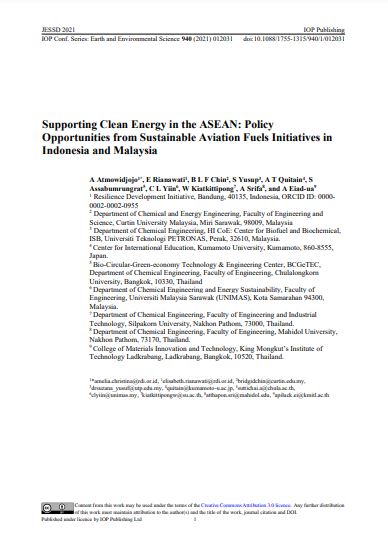
Keyword(s)
Author(s)
Atmowidjojo, A. (a), Rianawati, E. (a), Chin, B. (b), Yusup, S. (c), Quitain, A. (d), Assabumrungrat, S. (e), Yiin, C. (f), Kiatkittipong, W. (g), Srifa, A. (h), Eiad-ua, A. (i)
Publisher
Published Date
Access
DOI
(a) Resilience Development Initiative, Bandung, 40135, Indonesia, ORCID ID: 0000-0002-0002-0955
(b) Department of Chemical and Energy Engineering, Faculty of Engineering and Science, Curtin University Malaysia, Miri Sarawak, 98009, Malaysia
(c) Department of Chemical Engineering, HI CoE: Center for Biofuel and Biochemical, ISB, Universiti Teknologi PETRONAS, Perak, 32610, Malaysia.
(d) Center for International Education, Kumamoto University, Kumamoto, 860-8555, Japan.
(e) Bio-Circular-Green-economy Technology & Engineering Center, BCGeTEC, Department of Chemical Engineering, Faculty of Engineering, Chulalongkorn University, Bangkok, 10330, Thailand
(f) Department of Chemical Engineering and Energy Sustainability, Faculty of Engineering, Universiti Malaysia Sarawak (UNIMAS), Kota Samarahan 94300, Malaysia.
(g) Department of Chemical Engineering, Faculty of Engineering and Industrial Technology, Silpakorn University, Nakhon Pathom, 73000, Thailand.
(h) Department of Chemical Engineering, Faculty of Engineering, Mahidol University, Nakhon Pathom, 73170, Thailand.
(i) College of Materials Innovation and Technology, King Mongkut’s Institute of Technology Ladkrabang, Ladkrabang, Bangkok, 10520, Thailand.
Sustainable aviation fuels is a strategic long-term solution for zero-carbon aviation industry by 2050, thus underscoring the need to accelerate the deployment through reforms in the relevant key areas. Aligned to the agenda, this paper aims to study the policy opportunities for drop-in sustainable aviation fuel (SAF) deployment in the ASEAN by considering the initiatives undertaken. by Indonesia and Malaysia. Four areas are used as coding framework to assess the current status, challenges, and policy opportunities, namely (1) policy, strategy, and reforms; (2) standards and certification system; (3) economic instruments; and (4) international integration. First, the current status and challenges within each country is assessed. Indonesia has shown a more command-and-control approach with an upfront SAF blending mandate. However, it needs to be supported by several compliance measures. Malaysia, on the other hand, has conducted country assessments but no SAF-specific policy has been issued yet. Both countries still lack the economic instruments, while international integration is still relatively under-explored with only limited inter-regional partnerships. As the biggest palm-oil producing countries, Indonesia and Malaysia possess enormous potentials to lead the region in deploying SAF, thus more initiatives are urged.
Cite
Atmowidjojo, A., Rianawati, E., Chin, B., Yusup, S., Quitain, A., Assabumrungrat, S., Yiin, C., Kiatkittipong, W., Srifa, A., Eiad-ua, A. 2021. IOP Conf. Ser.: Earth Environ. Sci. 940 012031